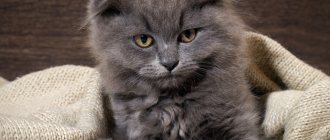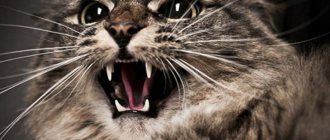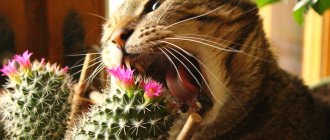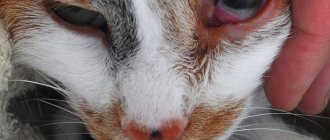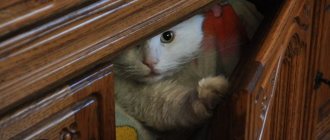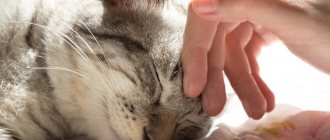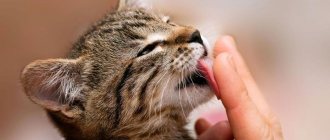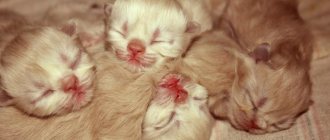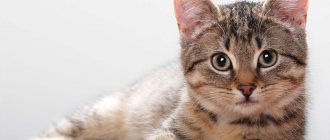Why does a cat's whiskers fall out?
Pet lovers need to know that cats have a natural tendency to periodically change their whiskers, and be able to distinguish this natural phenomenon from pathology.
The elongated hairs that interest us are called vibrissae and, however, when they wear out, they fall out. Moreover, this has nothing to do with molting. After the loss of an old hair, a new one grows in its place. Sometimes a cat can lose its whiskers due to its own carelessness and curiosity, becoming interested, for example, in a bright light.
The winning cats in cat fights demonstrate their superiority and dominance in the yard by gnawing off the whiskers of their opponent. Maternal instinct tells cats that by biting off the whiskers of spoiled kittens, you can calm them down and keep them close to you.
Why hairs fall out
If it’s not just another change of coarse hairs, then why does a cat’s whiskers fall out is a question that inexperienced owners often ask online. Loss of whiskers occurs due to disorders in the animal’s body, so it is important to recognize the symptoms in time and take action
Overactive thyroid gland
Hypothyroidism usually occurs in older cats. This disease affects all body systems and leads to increased metabolism. In addition to the loss of the mustache, other signs are observed:
- wool properties deteriorate;
- the animal is hyperactive and noticeably nervous;
- appetite increases with weight loss;
- the pet experiences increased thirst, which it constantly strives to satisfy;
- sometimes diarrhea and vomiting occur.
Dermatological bacterial infections and parasites
The roots of the whiskers, compared to the roots of the fur, are located quite deep in the skin. They are surrounded on all sides by nerves, blood vessels and sensitive muscles. The development of a bacterial skin infection or the proliferation of parasites in the facial part of the head often explains why a cat's whiskers fall out. Such pathologies, accompanied by unbearable itching, are easily identified during an initial examination of the skin.
Diabetes mellitus (diabetes insipidus)
These disturbances in the hormonal system lead to changes in metabolism. Diabetes mellitus in middle-aged and elderly cats is usually indicated by such signs as increased thirst and frequent urination, excessive appetite against the background of general exhaustion of the body. The pet needs immediate help, otherwise the patient’s condition will worsen, and the loss of the antennae, compared to other problems, will no longer be noticeable.
Food allergies and non-food allergic reactions
The cat's body, like the human body, can react completely unexpectedly to some foods. Loss of whiskers and fur, accompanied by itching, redness of the mucous membranes, profuse salivation and discharge from the eyes - a condition caused by an allergic reaction.
Non-food allergies can be triggered by a variety of chemicals, certain types of plants and other objects that appear in a cat's environment. It is sometimes very difficult to determine what exactly caused the rebellion in the body; you have to use the method of elimination. The course of treatment will require the use of antihistamines.
Metabolic disorders
When any illness appears, the metabolism in cats quickly makes itself known both in young and old age. The resulting pathologies manifest themselves as a rise in temperature, fluctuations in heart rate and other changes in the general condition.
In any case, you don’t need to think long about why your cat’s whiskers are falling out - a veterinary clinic specialist will explain in detail what to do in this situation.
How to solve a problem
If there is excessive loss of whiskers from the roots, the cat should be taken to a veterinary clinic. The specialist will conduct a series of tests and, depending on the cause, develop a treatment regimen.
If the loss of whiskers is associated with the development of the disease, the veterinarian will prescribe medication to the animal. When a food allergy is detected, the cat is not only advised to take medications. The owner will need to eliminate the product that caused the reaction from his diet and switch the pet to hypoallergenic food. If an allergy to any substance is detected, the owner must protect the cat from contact with it.
Why do mustaches break?
Don’t rush to panic if your pet’s whiskers sometimes break off.
Often this phenomenon is caused by hereditary factors. Representatives of some cat breeds, for example, Sphynxes, have whiskers that break at the behest of capricious nature.
The most common unnatural reasons are:
Lack of vitamins.
A state of vitamin deficiency is sometimes the root cause of why a cat's whiskers break. Other signs can help tell the owner that the purr is lacking some minerals:
- wool hairs fall off;
- claws look painful and brittle;
- a foul odor emanates from the mouth.
Often, pets suffer from a lack of taurine (due to the rare presence of meat products in the diet) and collagen, because they cannot get it on their own. A gradual decrease in collagen levels in a cat's body can lead to irreversible changes and may explain why a cat's whiskers break. Every professional breeder knows what to do when this problem is discovered. Special vitamin and mineral supplements allow you to constantly replenish the reserves of this precious element.
Unbalanced diet.
Another reason why a cat’s whiskers break off is the presence in the diet of foods unsuitable for animals, an overwhelming amount of fish, and cheap ready-made food. In the absence of other symptoms indicating serious illness, an incorrect feeding system may be the only explanation for the loss of whiskers.
Fungal infections.
A variety of fungi, penetrating into all layers of the skin, also affect the hair follicle, which becomes clogged, which prevents the mustache from germinating; or damage the structure of the vibrissa, which leads to its breaking off.
Infection with parasites and helminths.
The body throws all its strength into the fight against parasites. Forgotten mustaches break from lack of attention. Whisk eaters that have settled in their hair follicles often gnaw through the vibrissae.
The mustache also becomes brittle due to the proliferation of helminths in the body. Worms literally intercept beneficial nutrients on the way to the cat's organs, and they constantly poison and weaken the body in the process of their vital activity.
Sometimes pet lovers wonder why kittens' whiskers break off. The answer is simple: the antennae of all little furries break and fall out during adolescence. By consulting a veterinarian, you can help your pet get through this difficult time.
How can the owner help the pet?
If your pet has severely lost its whiskers, it is necessary to carefully examine it. Itching and skin diseases provoke hair loss and peeling of the epidermis in the sore spot. The animal can be especially bothered by head itching - as a result of constant washing and rubbing, the muzzle and whiskers will break off.
Itching is caused not only by food allergies, but also by atopic dermatitis, parasitic disease or lichen. The latter is extremely unpleasant due to its contagiousness, including to humans.
If focal baldness is detected, it is necessary to contact a specialist at the clinic. What else needs to be done?
- Firstly, the owner is obliged to establish what exactly the problem with the loss of the mustache is. Do the living conditions correspond to the normal existence of the animal - does the cat drink too little water, does it bathe often, is the air humid enough, what kind of food and shampoo is used.
- Preventive measures for deworming and eliminating parasites are carried out at least once every 4-6 months.
- With a cat, a visit to the clinic is necessary in case the pet is infected with a fungal infection or has a chronic disease.
- Be sure to review your diet and add foods rich in vitamins, minerals and healthy fatty acids. It is better to raise babies on natural food. If possible, buy holistic foods and premium food.
What to do if an animal’s whiskers begin to fall out
Having noticed a similar problem, every inexperienced owner wonders why the cat’s whiskers are falling out, what to do and how to help her. When hair loss is rare and temporary, there is nothing to worry about. Frequent and abundant loss and fragility of the whiskers is a reason for an early visit to the veterinarian.
Ignoring the problem can lead to serious complications during the development of certain diseases. Therefore, after making an accurate diagnosis, treatment should be started immediately in order to save your pet not only and not so much from whisker loss - sometimes even from death.
If during the examination and conversation it is revealed that the cause of the loss of whiskers was an incorrect feeding system, a veterinarian will help you adjust a new balanced diet.
The whiskers returning to their previous shape will be living evidence that restorative changes are taking place in the cat’s body.
Kitten care
Caring for a small creature is an important part of its life. The kitten will require daily care, and now the baby's health is in your hands. Therefore, in addition to regular visits to the veterinarian, conduct a daily self-examination. It only takes a few minutes, but can prevent serious trouble. Remember that in doubtful cases you should immediately contact a veterinarian!
Ears. Gently clean your kitten's ears with a cotton swab. If you notice redness, liquid discharge or scabs, contact your veterinarian. Ear mites are not uncommon in kittens. A thick, black, waxy discharge is a clear signal to contact your veterinarian. It is useful to wipe the visible part of the ears weekly with a moistened cotton ball. Never reach too deep into the ear - kittens' ears are delicate, and if you don't see what you're doing, you could damage them.
Eyes. In a healthy kitten and cat they always shine. Make sure there is no redness around the eyes. Cats' eyes usually don't require much care. Some short-nosed cats, especially Persians, may need to clean the folds under their eyes daily. Let your veterinarian and the breeder who sold the kitten show you what to do.
Mouth. If, after examining your kitten's small mouth, you notice changes in the color of the teeth and gums, these may be signs of periodontal disease.
Wool. Pay attention to dull or matted fur and oily skin. Although your short-haired kitten's hair won't get matted, brush his coat at least once a week, and even more often during shedding season. Brushing will stimulate the animal's skin, distribute hair oil evenly, remove dead hair, teach the kitten to be patient with touch, and give you the opportunity to do a quick and thorough examination of the kitten. Some long-haired kittens have fur that is not too thick or soft (for example, Norwegian Forest Cats and Maine Coons), and the hair rarely tangles. Others, such as Persian kittens, have matted fur, it seems, simply because they are moving. These kittens need daily brushing to look and feel their best.
Paws. Reddened paw pads are not a good sign. To prevent claws from hurting, the kitten should often sharpen them on a special post or scratching post. It is very useful to wipe or wash the kitten's paws after visiting the litter box.
